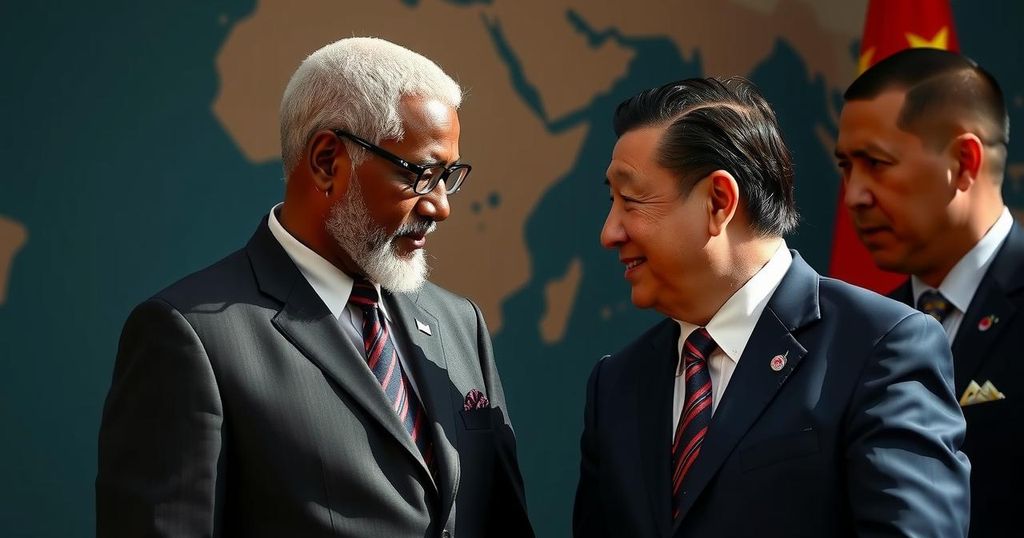Biden’s Historic Visit to Africa: Strengthening U.S. Ties and Countering China
President Biden is set to visit Angola as part of a commitment to strengthen U.S. ties with Africa, focusing on investment in initiatives such as the Lobito Corridor. His trip aims to counter China’s influence in the region while underlining U.S. partnerships that uphold high ethical standards. This visit marks a significant diplomatic move at the conclusion of Biden’s presidency, positioning the U.S. favorably against competing global interests.
President Joe Biden is embarking on a significant three-day visit to Africa, specifically Angola, marking a fulfillment of his two-year pledge to connect more closely with the continent. This trip, the first by a sitting U.S. president to sub-Saharan Africa since Barack Obama in 2015, aims to reinforce U.S. investments in African economies and counteract China’s growing dominance in the region. Biden plans to emphasize partnerships in sectors such as infrastructure, energy, and technological advancements, particularly highlighting the Lobito Corridor project, which is instrumental for economic development.
Biden’s anticipated visit follows a prior commitment made at the 2022 summit with African leaders, where he outlined intentions to enhance engagement and collaboration. Initially scheduled for October, it was postponed due to hurricanes affecting the eastern United States. During this visit, he will engage in high-level discussions with Angolan President João Manuel Gonçalves Lourenço and visit significant sites like the National Slavery Museum to reflect on shared histories and ongoing partnerships.
This diplomatic mission extends beyond mere goodwill, as it is strategically positioned against the backdrop of intensifying competition for influence in Africa, notably from China and Russia. With China pledging expansive investments through infrastructure initiatives such as its Belt and Road Initiative, Biden’s trip seeks to present the U.S. as a viable alternative that prioritizes higher ethical standards in investment, thereby establishing trust among African nations. U.S. officials have articulated that Biden’s leadership represents a shift from aid dependency towards fostering sustainable investments, which they believe will be beneficial even beyond his administration.
As he makes a symbolic refueling stop in Cape Verde, Biden will continue to engage with Angolan officials, promoting the notion of Angola as a crucial ally in U.S. foreign policy within Africa. His planned discussions include various partnership frameworks encompassing health security, agribusiness, and preservation of cultural heritage, specifically regarding UNESCO World Heritage initiatives.
The visit comes during a transitional period as Biden prepares to pass leadership to President-elect Donald Trump in January, a context that has not gone unnoticed by international stakeholders. President Lourenço of Angola expressed readiness to collaborate with the incoming administration, highlighting the resilience and continuity of U.S.-Africa relations, regardless of political shifts in Washington.
The significance of President Biden’s visit to Africa underscores a larger strategy of re-engaging with the continent amidst increasing geopolitical competition, particularly from China and Russia. There has been a noticeable shift in U.S. foreign policy towards Africa, concentrating on investment-driven diplomacy rather than traditional aid. The Lobito Corridor project exemplifies this pivot, presenting an initiative beneficial to both economic growth in Angola and the broader aims of U.S. policy in the region to stabilize its influence against adversarial powers. The timing of this visit holds importance as the U.S. positions itself favorably in light of previous criticisms of African nations and the fluctuating political landscape back home.
In summary, President Biden’s visit to Angola is a strategic effort to reinforce U.S. investment and partnerships in Africa while counterbalancing the competing influences of China and Russia. This engagement reflects a broader policy shift towards sustainable development through investments rather than aid. As Biden meets with Angolan leaders, he aims to lay the groundwork for a robust U.S.-Africa relationship that prioritizes ethical investment and collaborative efforts in addressing contemporary challenges faced by the region.
Original Source: www.cnn.com




Post Comment